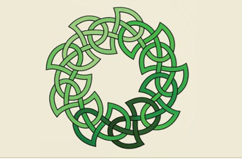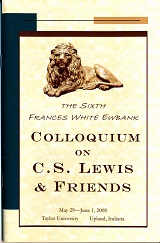Event Title
Session 5-C: Violent Readings: Interpreting Lewis and Chesterton
Location
Taylor University, Metcalf 104
Start Date
31-5-2008 3:30 PM
Description
"Holding a Pistol to the Head of 'Modern Man': the Roots of G.K. Chesterton's Spiritual Theology" - Robert Moore-Jumonville
G. K. Chesterton’s last line of The Babe Unborn presents the key to his profound spiritual theology—a way of seeing the world which conveys gratitude for sheer existence and a fairyland attitude of wonder, an astonished wonder arising from the possibility of non-existence: “If only I could find the door, if only I were born.” The essential features of Chesterton’s spiritual theology are elucidated in his 1912 novel Manalive, the main contours of which were drawn at the earliest stage of Chesterton’s theological thinking—the mid-1890s—before he began his career as a writer and at the critical point in his intellectual-spiritual development. Chesterton had descended briefly into suicidal despair only to arise again from the gloom with a fresh, open-eyed view of the world that perceived all life with appreciation and gratitude.
"Narnia and the Nazis" - John Seland
Lewis did not want his Narnia books to be seen as allegories. For one thing, this would force the reader to interpret the characters and events in a particular way. What is certain is that he wanted to show through the novels the validity of certain Christian truths and the need to fight the good fight in order to overcome evil. While this is his main motive, we also find in one of the novels, the Lion, the Witch and the Wardrobe, a framework that may well have been inspired by the menace of the Nazis. Thus, an evil Witch (Hitler or Nazism) enters a good place called Narnia (Europe) and controls it for a while. Then a beneficent being, Aslan (the Allies) counters the evil by means of good creatures, the Pevensie children and others, and eventually, after a fierce battle (World War II), the land is cleansed. Beyond this, in this book, as well as his later one, The Magician's Nephew, there are numerous hints, allusions, and references to Nazism. In the essay all this is explained in detail in order to show how Lewis, while staying true to his ideal of not writing allegory, deeply and consistently thought about the Nazi menace, and how he thought it could be overcome.
Moderator: Dan Bowell
Event Type
Paper
Link to Papers
Holding a Pistol to the Head of 'Modern Man': the Roots of G.K. Chesterton's Spiritual Theology
Narnia and the Nazis (Not available)
Session 5-C: Violent Readings: Interpreting Lewis and Chesterton
Taylor University, Metcalf 104
"Holding a Pistol to the Head of 'Modern Man': the Roots of G.K. Chesterton's Spiritual Theology" - Robert Moore-Jumonville
G. K. Chesterton’s last line of The Babe Unborn presents the key to his profound spiritual theology—a way of seeing the world which conveys gratitude for sheer existence and a fairyland attitude of wonder, an astonished wonder arising from the possibility of non-existence: “If only I could find the door, if only I were born.” The essential features of Chesterton’s spiritual theology are elucidated in his 1912 novel Manalive, the main contours of which were drawn at the earliest stage of Chesterton’s theological thinking—the mid-1890s—before he began his career as a writer and at the critical point in his intellectual-spiritual development. Chesterton had descended briefly into suicidal despair only to arise again from the gloom with a fresh, open-eyed view of the world that perceived all life with appreciation and gratitude.
"Narnia and the Nazis" - John Seland
Lewis did not want his Narnia books to be seen as allegories. For one thing, this would force the reader to interpret the characters and events in a particular way. What is certain is that he wanted to show through the novels the validity of certain Christian truths and the need to fight the good fight in order to overcome evil. While this is his main motive, we also find in one of the novels, the Lion, the Witch and the Wardrobe, a framework that may well have been inspired by the menace of the Nazis. Thus, an evil Witch (Hitler or Nazism) enters a good place called Narnia (Europe) and controls it for a while. Then a beneficent being, Aslan (the Allies) counters the evil by means of good creatures, the Pevensie children and others, and eventually, after a fierce battle (World War II), the land is cleansed. Beyond this, in this book, as well as his later one, The Magician's Nephew, there are numerous hints, allusions, and references to Nazism. In the essay all this is explained in detail in order to show how Lewis, while staying true to his ideal of not writing allegory, deeply and consistently thought about the Nazi menace, and how he thought it could be overcome.
Moderator: Dan Bowell


